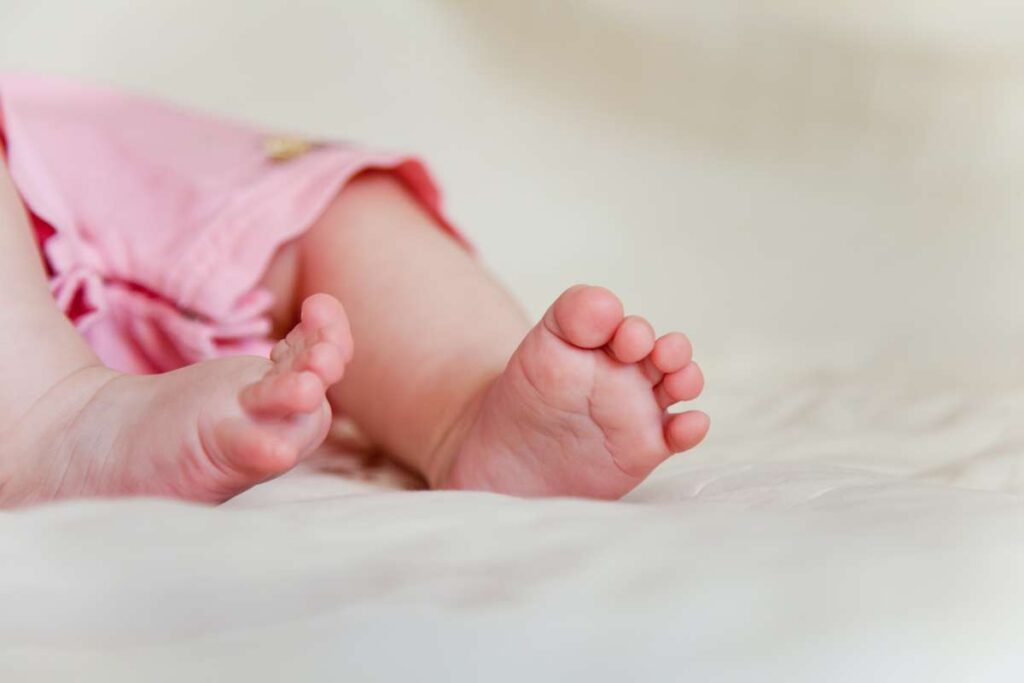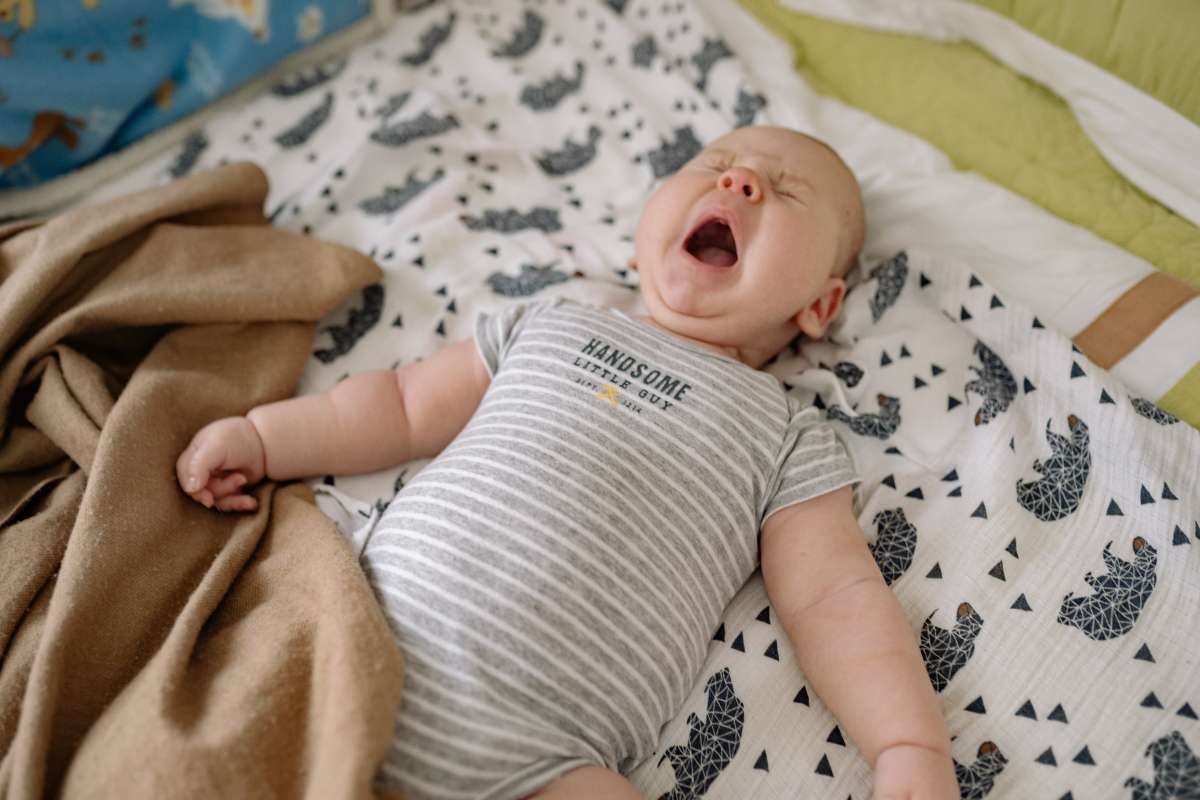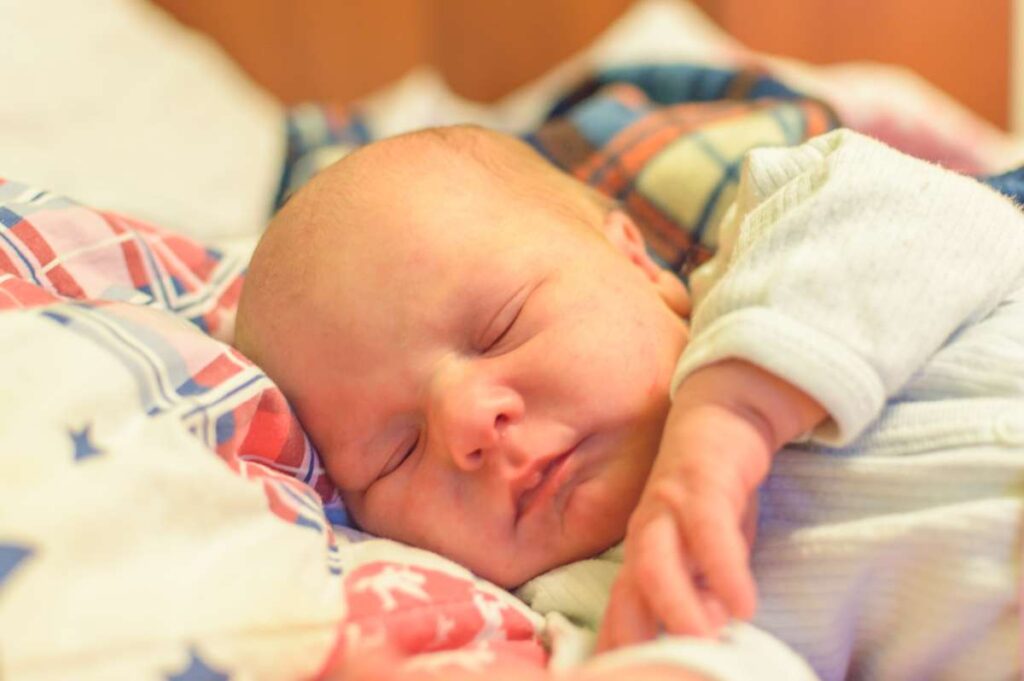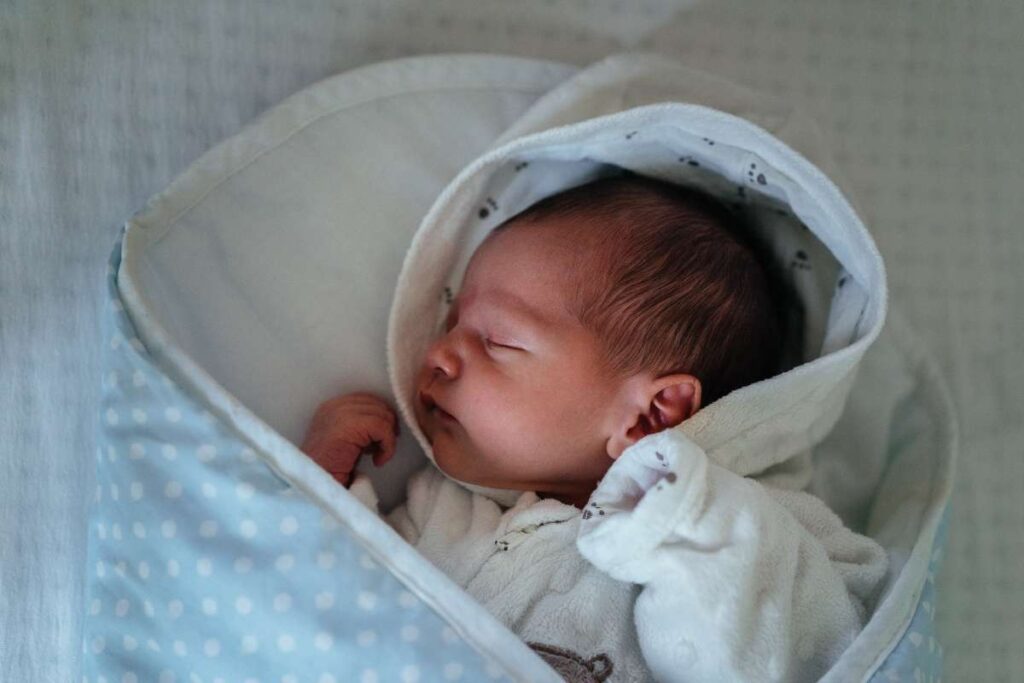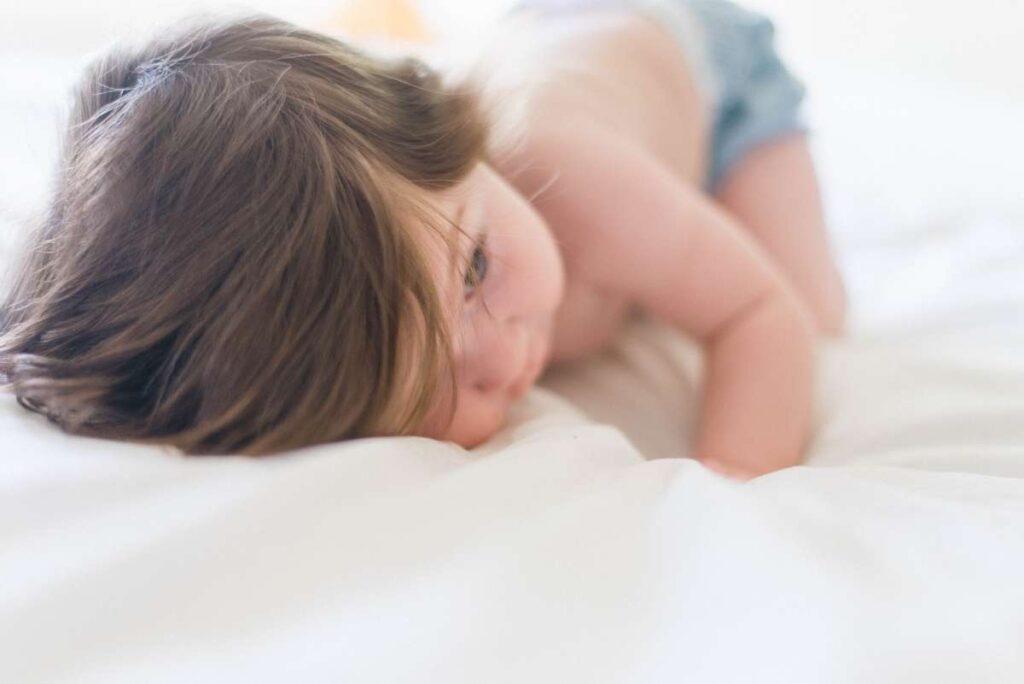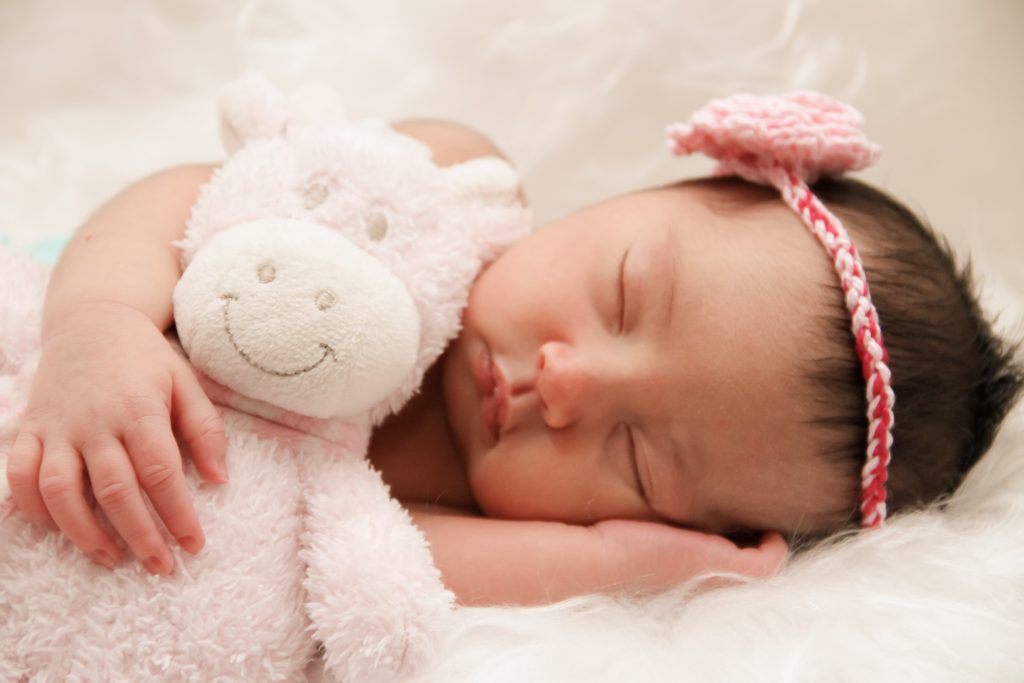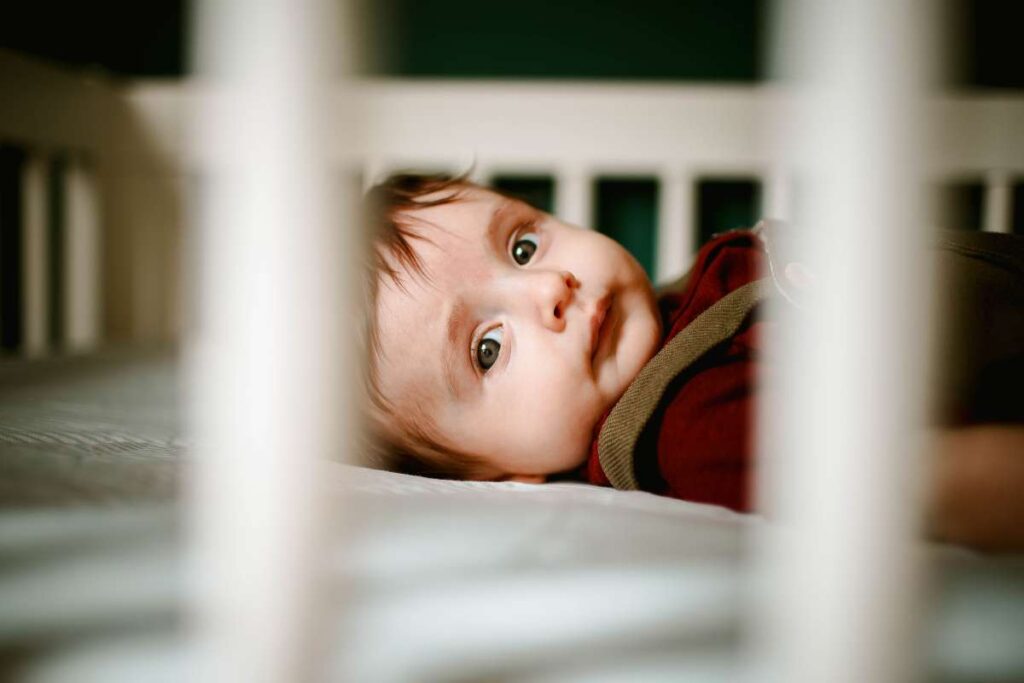Don't freak out right away. Keeping calm will make it easier to treat any signs of distress. Your infant may go unconscious from the fall.
In spite of how unconscious or limp they appear to be, they normally come to within a short period of time. That doesn't change the fact that this is a true medical emergency. Do not hesitate to contact emergency services or 911 if your infant shows signs of a severe head injury, such as profuse bleeding or unconsciousness.
Unless your infant is in imminent danger of suffering further injuries, you should not transfer them. Turn your kid on their side, keeping their neck straight, if they are vomiting or appear to be having a seizure.
Stop any bleeding you see by gently applying pressure with gauze or a clean towel or cloth until medical assistance comes.
If your infant doesn't seem to be in serious pain, take them up and soothe them. Fear and alarm will likely grip them. While trying to reassure them, check the back of their head for any obvious wounds.
If your baby is younger than one year old and has ever fallen out of bed, you should contact your doctor immediately.
If there are no obvious wounds, reassure your child. Once your infant has settled down, check for bruises and other injuries all over their body.
All the corners and edges of your furniture are rounded off. You turn off the lights, lock the doors, and seal the stairwell. To the best of your ability, you have made your home baby-proof.
Nonetheless, there will come a day when your kid gets hurt.
Some parents have experienced the heartbreak of having their child roll off the changing table when they turned their backs for just a second to reach for a diaper. They may be bringing a baby and a basket of laundry down the stairs when they lose their footing and tumble.
A mother's first instinct in this terrifying situation may be to pick up her fallen infant and head straight for the nearest medical room. But pause for a moment to catch your breath and take stock.
There are occasions when a baby who has fallen needs immediate medical assistance, and other times when they are completely OK without it. You want to make sure your infant gets the care they need, but you also don't want to put them through the trauma of an unnecessary emergency room visit or run up needless medical expenditures.
- Babies with an age difference of more than four months are more prone to shift position in bed, such as by rolling or turning.
- Your child needs to visit a doctor right away if he or she is drowsy, vomiting, spitting up, crying, and/or refusing to wake up after falling out of bed.
- A maximum of 120 centimetres in height should be used for the bed. Your child's bed railings should have no more than a 6 cm space between them.
Babies who are mobile (i.e., more than four months old) are especially prone to falling out of bed. When something like this occurs to a young child, the parents are understandably terrified.
Some infants will wail loudly if they roll out of bed, but they'll soon go back to their cheerful selves. As so, you have nothing to worry about. Immediately take your kid to the doctor if he or she shows any of the following symptoms if this happens to them:
- Any combination of drowsiness, vomiting, spitting up, whining, and inability to wake up after a fall from bed should alert you to the possibility of a brain damage, and prompt medical attention is warranted.
- Take your kid to the ER if he or she is hurt and starts bleeding.
- There are other signs that may point to abdominal harm, such as a child's refusal to eat like they do when they have a stomachache (e.g. to the liver or spleen). The presence of a diluted reddish hue in the urine after abdominal trauma is indicative of probable bladder injury.
- Your child may have injured his bones, joints, or muscles if he is unable to move his arms or legs.
Faqs About Baby’s Bed
“If there are no immediate signs of an injury, your baby could suffer from a concussion, a brain injury that causes temporary loss of normal brain functioning,” says Dr Balakrishnan. Prevent falls by making sure your baby does not sleep on an adult bed without supervision.
Watch the child carefully for 24 hours after a head injury to see whether they develop any signs of a serious head injury.
You'll need to hold it next to the bruise for about 20 minutes. It's common for babies to hit their heads while exploring, and they're usually back to their normal selves soon. However, keep an eye on your baby over the next 24 hours, and if you're still worried, phone your doctor for advice.
You should call your doctor after any fall from a bed if your baby is under one year old. If you don't immediately see any signs of injury, put your child at ease. Once your baby has calmed, you'll also want to inspect their body for any injuries or bruising.
Excessive bruising and swelling. Vomiting more than once. Unusual sleepiness and difficulty staying alert. Loss of consciousness or not responding to voice/touch.
Follow These Steps If Your Infant Rolls Off The Bed
The truth is, it's possible for anyone to experience this. For kids, this is the most common cause of injury. You have your infant lying on your bed, safely away from the side. Your back is turned for for a moment, and your child rolls off the bed.
So, tell me, what do you do? First of all, try not to freak out, as hard as that may be. Making ensuring your infant gets the correct help starts with taking a deep breath and making some initial observations. In case your child ends up in this awful situation, we also have some suggestions for you to follow.
Don't panic; take stock of the situation first.
Any parent's natural inclination to pick up their child at the first step will be tested. One of the most crucial pieces of advise is to not pick up a baby if they fall off the bed.
If your child has suffered a head or neck injury as a result of the accident, you should wait before moving them. Therefore, you shouldn't move your child unless doing so will prevent further injuries.
To prevent choking, gently roll your child onto their side if they fall off the bed and go into a seizure or start vomiting. Maintain a totally straight neck.
Even more so, if your infant is unresponsive, you'd probably dial emergency services right away. Similarly, you should contact emergency services if your infant has trouble staying awake or seems limp after a fall. If there is an open wound from the fall, apply light pressure and look for bruises.
Your youngster may act sleepy after any kind of fall. It's possible you'll want to check in with the paediatrician to see whether waking the infant up at regular intervals to look for signs of a concussion is recommended.
There's a chance your infant will be fussier, have a shorter attention span, and even throw up. Additionally, you may get neck and head ache.
Even if your child is acting regularly and breathing well, calling for medical help is warranted if you are having trouble waking him or her at a typical time.
Your child's doctor can advise you on whether or not to administer pain medication, and if so, how much.
Doctors usually recommend limiting your child's activity for at least 24 hours after an injury to prevent future harm. You should also keep away from any riding toys or anything that you can climb.
If your child attends daycare, you should talk to the staff about the incident and the need for further monitoring.
Get in touch with a medical professional
When in doubt about how to administer first aid for an injury like bleeding, bruises, or a bump to the head, a quick phone call to the doctor is all it takes to get the facts.
Call your doctor immediately if your infant experiences any kind of fall, but especially if they are very young.
No matter how little or severe the injuries appear to be, you may be asked to bring your kid into the office the same day. Playing it safe is the best course of action right now.
Your paediatrician will offer over-the-counter pain relievers like acetaminophen or ibuprofen in infant formula as part of the checkup to help alleviate your child's discomfort.
According to Healthline, you should contact emergency services if you have any of the following signs and symptoms:
- Nose and ears are bleeding
- Pimples on the sensitive areas
- Any other signs of trauma to the head, such as bruising or swelling in the temples, eyes, or ears
- Light and sound sensitive (including white noise)
- Pupillary dilation or an asymmetry in pupil size
- Depression brought on by constant sleepiness no matter the hour
Injuries such as this can include broken bones or internal bleeding.
Make sure to keep a watchful eye on things
Keep an eye on the infant's behaviour and other criteria to determine what to do if the baby falls off the bed but is not seriously injured. Babies are more likely to desire to sleep and rest than usual after such an experience.
Your paediatrician may urge you to wake your infant up at regular intervals to monitor for worsening symptoms and confirm that they are not experiencing a concussion.
When deciding to wake your infant, make sure to do the following checks:
- Assuming a simple awakening
- Once they know who you are
- If your breaths are regular
All should be well in a few days if you see all these symptoms. Any deviation from the norm, or the absence of any of the above symptoms, warrants an instant phone contact to emergency services or your regular doctor.
You worry about your child's safety so much that you take every precaution, but accidents still happen. If your infant slips out of bed, the most important thing you can do is to keep your cool.
Importantly, remember that no one will blame you for being too cautious if you decide to seek immediate medical attention by calling emergency services, seeing your doctor, or visiting the emergency room. Making sure your infant is healthy is a priority.
Symptom Monitoring and Initial Treatment
Apply a cold compress to the area of swelling if your kid is experiencing swelling, bruising, or a bump on the head, accompanied by sobbing followed by sudden pauses. After 24 hours without any additional symptoms, try applying a warm compress to the affected area.
However, if other symptoms appear after 24 hours, such as excessive and unusual weeping, vomiting, lethargy, or spitting up, you should take your child to the doctor right once.
Paracetamol is the pain reliever of choice for children because it has fewer side effects than other options. A trip to the doctor is warranted if, after the administration of pain medication, your kid continues to cry out in pain and exhibits no signs of improvement.
Keep a watch on your baby's behaviour over the next 24 hours, even if you don't think he or she needs immediate medical attention, because some injuries don't immediately show symptoms.
Dr. Ye Mon argues that after 24 hours, "it's usually reasonable to state that anything terrible is less likely."
Whether or not they have sustained a concussion, babies often want to sleep after falling. Even if Dr. Ye Mon says it's not necessary to keep them awake in order to monitor them, you should still try waking them up every few hours just to be safe. Seek quick medical attention if they aren't.
Your baby's behaviour should also be evaluated by a medical professional if you detect any deviations from the norm, such as increased fussiness or inconsolability.
Also, go with your gut if you feel like your child may have been hurt.
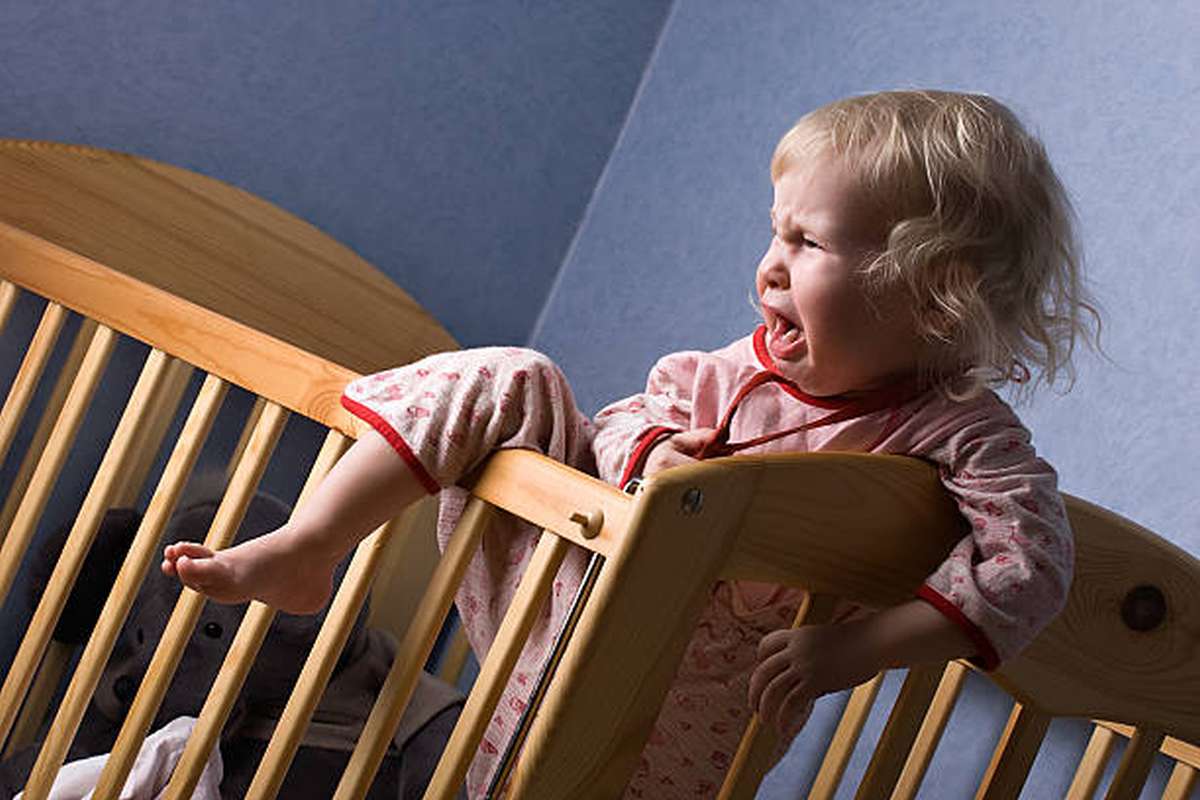
Is this really An Emergency?
Even though it may be difficult to discern, there are a few telltale symptoms that an infant has been hurt or is in pain.
Check for symptoms of head damage before picking up a child after a fall; if you see any, dial 9-1-1 immediately. Among these symptoms are:
- Inability to maintain mental awareness; coma.Vomiting.Bleeding from the nose or the ears.Pimples on the tender place.Head
- trauma accompanied by visible signs of skull fracture, such as bruising or swelling, or both.
Avoid the temptation to pick up your child and console them if any of these symptoms are present. "With head traumas, it's likely that they've also hurt their neck or spine, and you don't want to exacerbate the condition by maybe moving them," Dr. Ye Mon adds.
Any abnormality that looks like it might be a bone is a broken bone, no matter where it is on the body.
She advises that if your infant is having a seizure following a fall, you should gently roll them onto their side before dialling 9-1-1.
If the infant is awake and crying (a natural response for a startled baby, even if there is no injury), but there are no outward signs of trauma, pick them up gently and soothe them.
The warning signals that it's time to visit the emergency room.
If your infant is exhibiting any of these symptoms, you should take him or her to the emergency hospital immediately, even if he or she is conscious and does not appear to have a serious injury. Some examples of these are:
- symptoms include a high-pitched cry, inconsolability, a swelling of the soft region in the front of the skull, persistent rubbing of the head, and crimson or yellow fluid flowing from the nose or ears.
- dizziness or trouble coordinating your movements irregular or dilated pupils increased or decreased sensitivity to sound or light nausea and vomiting
Seek immediate medical treatment if you experience any of these symptoms.
Seek prompt medical assistance if you detect any changes in your baby's behaviour that seem out of the ordinary. Precaution is the best course of action here.
Keep in mind that most babies don't incur a severe injury or head damage from falling off the bed, but it's still vital to keep an eye on them and see a doctor if you're worried.
Causing Factors of Falls in Bed
- Abandoning a child older than 4 months. By this age, most kids have figured out how to roll over on their own. However, you shouldn't relax just because your baby is younger than four months old and isn't yet mobile. Always remember to keep an eye on your infant.
- Poorly suited bedding, such as beds without guards or those with rails that are overly wide.
- Extra-tall beds (those that are higher than 120 centimetres). A child's risk of brain bleeding is increased if they fall from a high bed.
- Beds with rails, holes, or gaps bigger than 6 cm. Your infant's head may fit through the openings, but their limbs and legs may not. Additionally, incidents like self-strangulation are possible if your child's legs cannot reach the floor.
Keep Your Infant Safe in Bed and Avoid Injury
- Each side of your child's bed or cot should have a secure guard to prevent them from falling out. Having the child bump into the guard and loosen it could result in the child falling out of bed, therefore this is done to prevent that from happening.
- Your child's bed railings should have no more than a 6 cm space between them. To stop a child from putting their arms or legs through the cot or bed rails, you can prop a sheet or pillow on the outside of the rails.
- Keep your sleeping arrangements low to the ground, like a mattress on the floor.
- Don't ever let your kid sleep in the guest bedroom. It's important for parents and guardians to always be within eyeshot of their children.
Parents may think their child isn't at risk of falling out of bed, but it actually happens more often than you might expect. Only a moment of indolence on your part as a parent is all it takes. Serious problems can arise if your youngster slips out of bed.
Never leave your child unattended or unsupervised, and always use a safe bed to protect them from harm. Though they can't be predicted, accidents can be avoided.
Conclusion
Keeping calm will make it easier to treat any signs of distress. Your infant may go unconscious from the fall but should come to within a short period of time. If your baby is younger than one year old and has ever fallen out of bed, you should contact your doctor immediately. If your infant rolls off the bed, or if they are more than four months old, visit a doctor right away. Drowsiness, vomiting, spitting up, crying, and inability to wake up after a fall from bed should alert you to the possibility of brain damage.
If your child falls off the bed and starts vomiting or if they are unresponsive, you should call emergency services right away. If there is an open wound from the fall, apply light pressure and look for bruises. Doctors usually recommend limiting your child's activity for at least 24 hours after an injury. If your infant falls out of bed and experiences any of the following signs and symptoms: bleeding nose, bruising, sensitivity to white noise or swelling in the eyes, ears, or temples, call your paediatrician immediately. Babies are more likely to desire to sleep and rest than usual after such an experience.
There are a few telltale symptoms that an infant has been hurt or is in pain. Most babies don't incur a severe injury or head damage from falling off the bed, but it's still vital to keep an eye on them and see a doctor if you're worried. Some examples of these are a high-pitched cry, inconsolability, swelling of the soft region in the front of the skull or persistent rubbing of the head. Poorly suited bedding, such as beds without guards or those with rails that are overly wide. Extra-tall beds (those that are higher than 120 centimetres).
A child's risk of brain bleeding is increased if they fall from a high bed. Don't ever let your child sleep in the guest bedroom.
Content Summary
- Don't freak out right away.
- Keeping calm will make it easier to treat any signs of distress.
- Your infant may go unconscious from the fall.
- That doesn't change the fact that this is a true medical emergency.
- Do not hesitate to contact emergency services or 911 if your infant shows signs of a severe head injury, such as profuse bleeding or unconsciousness.
- Unless your infant is in imminent danger of suffering further injuries, you should not transfer them.
- If your infant doesn't seem to be in serious pain, take them up and soothe them.
- While trying to reassure them, check the back of their head for any obvious wounds.
- If there are no obvious wounds, reassure your child.
- Once your infant has settled down, check for bruises and other injuries all over their body.
- To the best of your ability, you have made your home baby-proof.
- Nonetheless, there will come a day when your kid gets hurt.
- A mother's first instinct in this terrifying situation may be to pick up her fallen infant and head straight for the nearest medical room.
- There are occasions when a baby who has fallen needs immediate medical assistance, and other times when they are completely OK without it.
- You want to make sure your infant gets the care they need, but you also don't want to put them through the trauma of an unnecessary emergency room visit or run up needless medical expenditures.
- Your child needs to visit a doctor right away if he or she is drowsy, vomiting, spitting up, crying, and/or refusing to wake up after falling out of bed.
- Babies who are mobile (i.e., more than four months old) are especially prone to falling out of bed.
- Immediately take your kid to the doctor if he or she shows any of the following symptoms if this happens to them: Any combination of drowsiness, vomiting, spitting up, whining, and inability to wake up after a fall from bed should alert you to the possibility of a brain damage, and prompt medical attention is warranted.
- Take your kid to the ER if he or she is hurt and starts bleeding.
- For kids, this is the most common cause of injury.
- You have your infant lying on your bed, safely away from the side.
- Your back is turned for for a moment, and your child rolls off the bed.
- First of all, try not to freak out, as hard as that may be.
- Don't panic; take stock of the situation first.
- One of the most crucial pieces of advise is to not pick up a baby if they fall off the bed.
- If your child has suffered a head or neck injury as a result of the accident, you should wait before moving them.
- To prevent choking, gently roll your child onto their side if they fall off the bed and go into a seizure or start vomiting.
- Even more so, if your infant is unresponsive, you'd probably dial emergency services right away.
- Similarly, you should contact emergency services if your infant has trouble staying awake or seems limp after a fall.
- It's possible you'll want to check in with the paediatrician to see whether waking the infant up at regular intervals to look for signs of a concussion is recommended.
- Even if your child is acting regularly and breathing well, calling for medical help is warranted if you are having trouble waking him or her at a typical time.
- You should also keep away from any riding toys or anything that you can climb.
- If your child attends daycare, you should talk to the staff about the incident and the need for further monitoring.
- Get in touch with a medical professional When in doubt about how to administer first aid for an injury like bleeding, bruises, or a bump to the head, a quick phone call to the doctor is all it takes to get the facts.
- Call your doctor immediately if your infant experiences any kind of fall, but especially if they are very young.
- No matter how little or severe the injuries appear to be, you may be asked to bring your kid into the office the same day.
- According to Healthline, you should contact emergency services if you have any of the following signs and symptoms: Nose and ears are bleeding Pimples on the sensitive areas Any other signs of trauma to the head, such as bruising or swelling in the temples, eyes, or ears Light and sound sensitive (including white noise) Pupillary dilation or an asymmetry in pupil size Depression brought on by constant sleepiness no matter the hour Injuries such as this can include broken bones or internal bleeding.
- Make sure to keep a watchful eye on things Keep an eye on the infant's behaviour and other criteria to determine what to do if the baby falls off the bed but is not seriously injured.
- Your paediatrician may urge you to wake your infant up at regular intervals to monitor for worsening symptoms and confirm that they are not experiencing a concussion.
- Any deviation from the norm, or the absence of any of the above symptoms, warrants an instant phone contact to emergency services or your regular doctor.
- You worry about your child's safety so much that you take every precaution, but accidents still happen.
- If your infant slips out of bed, the most important thing you can do is to keep your cool.
- Importantly, remember that no one will blame you for being too cautious if you decide to seek immediate medical attention by calling emergency services, seeing your doctor, or visiting the emergency room.
- Making sure your infant is healthy is a priority.
- However, if other symptoms appear after 24 hours, such as excessive and unusual weeping, vomiting, lethargy, or spitting up, you should take your child to the doctor right once.
- A trip to the doctor is warranted if, after the administration of pain medication, your kid continues to cry out in pain and exhibits no signs of improvement.
- Keep a watch on your baby's behaviour over the next 24 hours, even if you don't think he or she needs immediate medical attention, because some injuries don't immediately show symptoms.
- Seek quick medical attention if they aren't.
- Even though it may be difficult to discern, there are a few telltale symptoms that an infant has been hurt or is in pain.
- Check for symptoms of head damage before picking up a child after a fall; if you see any, dial 9-1-1 immediately.
- Among these symptoms are: Inability to maintain mental awareness; coma.
- Head trauma accompanied by visible signs of skull fracture, such as bruising or swelling, or both.
- Avoid the temptation to pick up your child and console them if any of these symptoms are present. "
- The warning signals that it's time to visit the emergency room.
- If your infant is exhibiting any of these symptoms, you should take him or her to the emergency hospital immediately, even if he or she is conscious and does not appear to have a serious injury.
- Some examples of these are: symptoms include a high-pitched cry, inconsolability, a swelling of the soft region in the front of the skull, persistent rubbing of the head, and crimson or yellow fluid flowing from the nose or ears.
- Seek prompt medical assistance if you detect any changes in your baby's behaviour that seem out of the ordinary.
- Precaution is the best course of action here.
